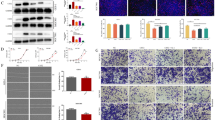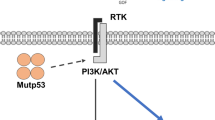Abstract
Background
Emerging evidence showed that FAT10 is a vital regulator of tumor occurrence and development. The molecular mechanisms underlying the specific role of FAT10 in colorectal cancer (CRC) are not yet known.
Aims
To investigate whether FAT10 participates in the proliferation, invasion and metastasis of CRC.
Methods
This study investigated the function and clinical significance of FAT10 protein expression in CRC. Furthermore, over-expression and knockdown experiments of FAT10 were developed to explore their effects on CRC cell migration and proliferation. Moreover, a molecular mechanism of FAT10 regulate calpain small subunit 1(Capn4) was explored.
Results
In this research, the FAT10 expression level was elevated in CRC tissues compared to corresponding normal tissues. In addition, the elevated FAT10 expression level is significantly linked to advanced clinical stage and poor CRC prognosis. Furthermore, a very high expression of FAT10 was observed in CRC cells, and FAT10 overexpression significantly enhanced the in vivo proliferation, invasion, and metastasis of the cells, whereas knockdown of FAT10 inhibited all these cellular factors in both in vivo and in vitro environments. Moreover, the outcomes of this study suggested that FAT10 enhances colorectal cancer progression through enhancement of Capn4 expression, leading to the progression of various human tumors, as reported by previous research. The mechanism via which FAT10 promotes CRC cells proliferation, invasion, and metastasis involves modification of the ubiquitination and degradation processes of Capn4.
Conclusion
FAT10 is a vital regulator of the tumorigenesis and advancement of CRC, thus serving as a promising pharmaceutical target for treating CRC patients.






Similar content being viewed by others
References
Siegel RL, Miller KD, Jemal A. Cancer statistics, 2019 CA Cancer J Clin. 2019;69:7–34.
Global Burden of Disease Cancer C, Fitzmaurice C, Abate D et al. Global, Regional, and National Cancer Incidence, Mortality, Years of Life Lost, Years Lived With Disability, and Disability-Adjusted Life-Years for 29 Cancer Groups, 1990 to 2017: A Systematic Analysis for the Global Burden of Disease Study JAMA Oncol. 2019;5:1749–1768.
Vulcan A, Brandstedt J, Manjer J, Jirstrom K, Ohlsson B, Ericson U. Fibre intake and incident colorectal cancer depending on fibre source, sex, tumour location and Tumour. Node, Metastasis stage Br J Nutr. 2015;114:959–969.
Bialas J, Boehm AN, Catone N, Aichem A, Groettrup M. The ubiquitin-like modifier FAT10 stimulates the activity of deubiquitylating enzyme OTUB1 J Biol Chem. 2019;294:4315–4330.
Theng SS, Wang W, Mah WC et al. Disruption of FAT10-MAD2 binding inhibits tumor progression Proc Natl Acad Sci U S A. 2014;111:E5282–5291;
Merbl Y, Refour P, Patel H, Springer M, Kirschner MW. Profiling of ubiquitin-like modifications reveals features of mitotic control Cell. 2013;152:1160–1172.
Xiang S, Shao X, Cao J, Yang B, He Q, Ying M. FAT10: Function and Relationship with Cancer Curr Mol Pharmacol. 2020;13:182–191.
Aichem A, Groettrup M. The ubiquitin-like modifier FAT10 in cancer development Int J Biochem Cell Biol. 2016;79:451–461.
Yuan R, Wang K, Hu J et al. Ubiquitin-like protein FAT10 promotes the invasion and metastasis of hepatocellular carcinoma by modifying beta-catenin degradation Cancer Res. 2014;74:5287–5300.
Liu X, Chen L, Ge J et al. The Ubiquitin-like Protein FAT10 Stabilizes eEF1A1 Expression to Promote Tumor Proliferation in a Complex Manner Cancer Res. 2016;76:4897–4907.
Zhang CY, Sun J, Wang X, Wang CF, Zeng XD. Clinicopathological significance of human leukocyte antigen F-associated transcript 10 expression in colorectal cancer World J Gastrointest Oncol. 2019;11:9–16.
Zhao C, Yuan G, Jiang Y et al. Capn4 contributes to tumor invasion and metastasis in gastric cancer via activation of the Wnt/beta-catenin/MMP9 signalling pathways Exp Cell Res. 2020;395:112220.
Zhuang Q, Luo W, Zhang M et al. Capn4 contributes to tumor invasion and metastasis in clear cell renal cell carcinoma cells via modulating talin-focal adhesion kinase signaling pathway Acta Biochim Biophys Sin (Shanghai). 2018;50:465–472.
Wu X, Zhang H, Chen C et al. High expression of Capn4 is associated with metastasis and poor prognosis in esophageal squamous cell carcinoma Int J Clin Exp Pathol. 2018;11:765–772;
Cheng F, Mohanmed MM, Li Z et al. Capn4 promotes colorectal cancer cell proliferation by increasing MAPK7 through activation of the Wnt/beta-Catenin pathway Exp Cell Res. 2018;363:235–242.
Cappadocia L, Lima CD. Ubiquitin-like Protein Conjugation: Structures. Chemistry, and Mechanism Chem Rev. 2018;118:889–918.
Liu S, Jin Y, Zhang D, Wang J, Wang G, Lee CGL. Investigating the Promoter of FAT10 Gene in HCC Patients Genes (Basel). 2018;9.
Asangani IA, Rasheed SA, Leupold JH, Post S, Allgayer H. NRF-1, and AP-1 regulate the promoter of the human calpain small subunit 1 (CAPNS1) gene Gene. 2008;410:197–206.
Gu J, Xu FK, Zhao GY et al. Capn4 promotes non-small cell lung cancer progression via upregulation of matrix metalloproteinase 2 Med Oncol. 2015;32:51.
Dai Z, Zhou SL, Zhou ZJ et al. Capn4 contributes to tumour growth and metastasis of hepatocellular carcinoma by activation of the FAK-Src signalling pathways J Pathol. 2014;234:316–328.
Schmidtke G, Aichem A, Groettrup M. FAT10ylation as a signal for proteasomal degradation Biochim Biophys Acta. 2014;1843:97–102.
Deng X, Deng J, Yi X et al. Ubiquitin-like protein FAT10 promotes osteosarcoma glycolysis and growth by upregulating PFKFB3 via stabilization of EGFR Am J Cancer Res. 2020;10:2066–2082.
Yan J, Lei J, Chen L et al. Human Leukocyte Antigen F Locus Adjacent Transcript 10 Overexpression Disturbs WISP1 Protein and mRNA Expression to Promote Hepatocellular Carcinoma Progression Hepatology. 2018;68:2268–2284.
Morgan JJ, Crawford LJ. The Ubiquitin Proteasome System in Genome Stability and Cancer Cancers (Basel). 2021;13.
Mackinnon E, Stone SL. The Ubiquitin Proteasome System and Nutrient Stress Response Front Plant Sci. 2022;13:867419.
Lu C, Qiao P, Fu R et al. Phosphorylation of PFKFB4 by PIM2 promotes anaerobic glycolysis and cell proliferation in endometriosis Cell Death Dis. 2022;13:790.
Zhou Q, Peng X, Liu X et al. FAT10 attenuates hypoxia-induced cardiomyocyte apoptosis by stabilizing caveolin-3 J Mol Cell Cardiol. 2018;116:115–124.
Acknowledgments
The authors are particularly thankful to the Jiangxi Key Laboratory of Molecular Medicine, the Second Affiliated Hospital of Nanchang University, for the supply of experimental facilities.
Funding
The National Natural Science Foundation of China (No.81860432) and the Natural Science Foundation of Jiangxi Provincial (No.20171BAB205064) supported this study by providing grants.
Author information
Authors and Affiliations
Contributions
WS and FC designed the study; FC, LY and ZW performed the research; XL, WX, ZH, ZL and SM analysed data; WS and FC wrote the paper.
Corresponding author
Ethics declarations
Conflict of interest
The authors declare that they have no conflict of interest.
Additional information
Publisher's Note
Springer Nature remains neutral with regard to jurisdictional claims in published maps and institutional affiliations.
Rights and permissions
Springer Nature or its licensor (e.g. a society or other partner) holds exclusive rights to this article under a publishing agreement with the author(s) or other rightsholder(s); author self-archiving of the accepted manuscript version of this article is solely governed by the terms of such publishing agreement and applicable law.
About this article
Cite this article
Cheng, F., Yuan, L., Wu, Z. et al. Ubiquitin-Like Protein FAT10 Promote Colorectal Cancer Progression by Affecting the Ubiquitination of Capn4. Dig Dis Sci 68, 3312–3323 (2023). https://doi.org/10.1007/s10620-023-07995-1
Received:
Accepted:
Published:
Issue Date:
DOI: https://doi.org/10.1007/s10620-023-07995-1




